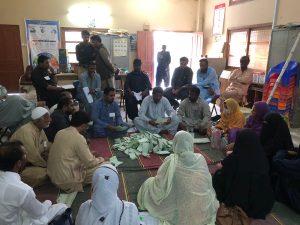Like other provinces in Pakistan, Balochistan voted in elections to the national and provincial assemblies on February 8. And like them, it had to wait for over 48 hours before the final results were announced.
As elsewhere in Pakistan, voter turnout in Balochistan was low. However, the turnout in Balochistan, which was just 42 percent, was lower than the nationwide turnout of 47 percent, as reported by the Free and Fair Election Network (FAFEN). In the 2018 elections, 45 percent of registered voters exercised their franchise in Balochistan.
Of the 51 seats in the Balochistan Assembly, the Pakistan People’s Party (PPP) won 11 seats (21 percent), followed by the Pakistan Muslim League Nawaz (PML-N) with 10 seats (19 percent), Jamiat Ulama-e-Islam (JUI) with 11, independent candidates with six, the Balochistan Awami Party (BAP) with four, and the National Party with three. The newly formed Haq Do Tehreeq (HDT) and the Balochistan National Party (BNP) won a single seat each.
Incidentally, in the 2018 elections, BAP, which was formed only a few months before the polls, won 13 seats, and with the support of independent candidates notched up a tally of 18 seats to form the provincial government.
Polling in Balochistan was hit by violence. There were several grenade attacks near polling stations in Gwadar district. Two deadly bomb attacks in Pishin district, north of Quetta city, and Qilla Saifullah near the offices of political parties led to the deaths of more than 30 people. Despite the deployment of as many as 700,000 security officials on election duties, the situation around polling stations across the province was tense. Election violence is not new in Balochistan. In previous elections too there were attacks on candidates and their offices as well as on polling stations.
The results of the recent elections have come as a surprise to many in Balochistan. The parties that won the most seats were not expected to do well. Besides, the Baloch nationalist parties performed poorly. The BNP, one of Balochistan’s largest political parties, won only one seat in the provincial assembly and two seats in the National Assembly.
According to the Election Commission of Pakistan, in NA-264, Akhtar Mengal, the 61-year-old former chief minister of Balochistan, was defeated by 25-year-old Siraj Raisani of the PPP. Raisani was a caretaker provincial minister for sports and youth affairs before he resigned in December 2023 to contest in the elections. In fact, his nomination papers were rejected by the Balochistan High Court (BHC) in January after the BNP filed an appeal challenging his candidacy as he was not registered in any constituency as a voter. But later the BHC allowed him to contest elections. Rainsani’s victory against Mengal is thus hugely controversial.
Several candidates who were declared winners are not known in their constituencies. This is the case in NA-259 Kech-Gwadar, where Malik Shah Gorgaij of the PPP won against the immensely popular NP politician and former Balochistan Chief Minister Dr. Abdul Malik and the HDT’s Hussain Wadela. Gorgaij’s son, Ubiad Ullah, who contested and won in a Quetta provincial assembly constituency, is hardly known there.
These and many other controversial wins have triggered allegations of rigging and sparked widespread protests in the province. Several political parties have held press conferences to draw attention to the manipulation of elections in favor of the PPP and PML-N. The NP’s General Secretary Jan Muhammad Buledi, who lost the provincial assembly election from Kech, has appealed against the election result, citing rigging concerns.
Unfortunately, election rigging is the norm in Pakistan. Elections are held to project a facade of democracy, even as the outcome of elections is strategically manipulated.
This has not only undermined the essence of the democratic process but also increased public distrust of the electoral system.
Balochistan is an already restive and problematic province. Alienation from the state is widespread. It is concerning when those not even known to the people of their constituencies are handpicked to represent them in the provincial and national assemblies.
In the last 10 years, Balochistan has witnessed over 2,700 terrorism-related incidents. These have claimed the lives of over 5,000 people and left thousands more injured, according to the South Asian Terrorist Portal.
In the months leading up to the end of 2023, Islamabad’s National Press Club was the site of a powerful and prolonged sit-in. Around 300 people, predominantly women from Balochistan, participated in the protests. They demanded justice for disappeared persons and an end to extrajudicial killings in the province. In 2021, the Haq Do Tehreeq emerged in the port city of Gwadar, advocating for the social and political rights of the people. These powerful mass protests and movements underscore the depth of anger and alienation in the province.
The recent elections were an opportunity for the state to win back the trust of the people of Balochistan. Letting them decide who will represent them in the legislature would have been a step in the right direction. Instead, it seemed to have been pre-decided who would sit in the assemblies. This will further weaken public trust in the ballot box route to addressing their grievances.

































